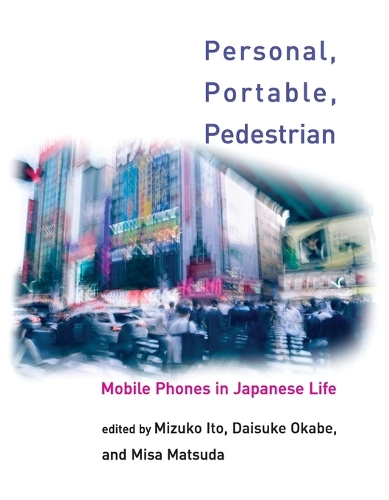
Personal, Portable, Pedestrian: Mobile Phones in Japanese Life
(Paperback)
Publishing Details
Personal, Portable, Pedestrian: Mobile Phones in Japanese Life
By (Author) Mizuko Ito
Edited by Misa Matsuda
Edited by Daisuke Okabe
MIT Press Ltd
MIT Press
8th September 2006
United States
Classifications
Professional and Scholarly
Non Fiction
Impact of science and technology on society
306.46
Physical Properties
Paperback
372
Width 178mm, Height 229mm, Spine 19mm
612g
Description
How mobile communications in Japan became a pervasively personal tool that connects families and friends, creating "always-on" social engagement.The Japanese term for mobile phone, keitai (roughly translated as "something you carry with you"), evokes not technical capability or freedom of movement but intimacy and portability, defining a personal accessory that allows constant social connection. Japan's enthusiastic engagement with mobile technology has become-along with anime, manga, and sushi-part of its trendsetting popular culture. Personal, Portable, Pedestrian, the first book-length English-language treatment of mobile communication use in Japan, covers the transformation of keitai from business tool to personal device for communication and play. The essays in this groundbreaking collection document the emergence, incorporation, and domestication of mobile communications in a wide range of social practices and institutions. The book first considers the social, cultural, and historical context of keitai development, including its beginnings in youth pager use in the early 1990s. It then discusses the virtually seamless integration of keitai use into everyday life, contrasting it to the more escapist character of Internet use on the PC. Other essays suggest that the use of mobile communication reinforces ties between close friends and family, producing "tele-cocooning" by tight-knit social groups. The book also discusses mobile phone manners and examines keitai use by copier technicians, multitasking housewives, and school children. Personal, Portable, Pedestrian describes a mobile universe in which networked relations are a pervasive and persistent fixture of everyday life.
Reviews
"Geert Lovink taught me how to think critically about technology, and I always turn to him for thoughtful and humane analysis. Too few technology writers have any sense of social and cultural context, and too few technology critics have an appreciation of why people find technologies attractive and how they improve people's lives. I recommend Dark Fiber to those who haven't yet learned to think critically about Internet technology and the culture that has grown up around it, and to those critics who fail to see the real advantages afforded by the Internet."--Howard Rheingold, author of *The Virtual Community* and *Smart Mobs: The Next Social Revolution*
Author Bio
Mizuko Ito is a cultural anthropologist who studies new media use, particularly among young people, in Japan and the United States, and a Professor in Residence at the University of California Humanities Research Institute. Misa Matsuda is Assistant Professor of Sociology at Chuo University, Tokyo. Daisuke Okabe is Lecturer at the Graduate School of Media and Governance, Keio University, Shonan Fujisawa Campus, Japan.
